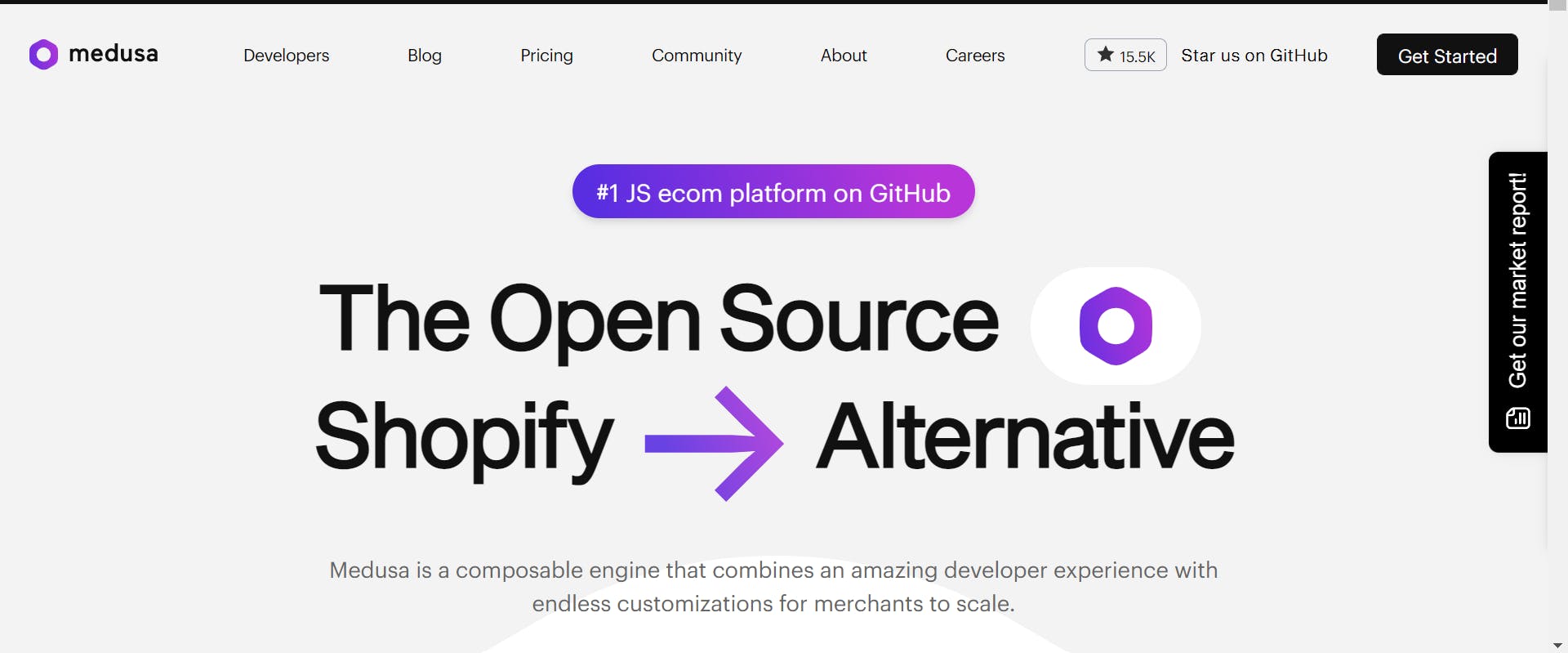Ecommerce platforms are software applications used and managed by businesses to sell their products and services. They also allow customers to access a brand’s marketplace online, maintain contact, make inquiries, and make purchases. These applications aid businesses with tools used to create online stores, process payments, fulfill orders and take on customer care. It is important to choose an ecommerce platform that suits your company’s needs and organizations. Ecommerce platforms can be built by the business owners themselves or their internal team, with custom software, and features. This is known as a self-hosted ecommerce platform. Examples of self-hosted ecommerce platforms are Medusa, WooCommerce, PrestaShop, and Magento. Businesses can also choose to use hosted ecommerce platforms, owned and maintained by third-party providers. Examples are Shopify, Squarespace, Wix, Weebly, and BigCommerce. Some ecommerce platforms are popular among businesses seeking an online presence and space to market their goods. This article will focus on Medusa, a headless ecommerce platform with endless customizations for online businesses.
Medusa
 Medusa is a headless commerce platform that runs on a node.js network. It can be used for any digital commerce activities, from online stores for small businesses and startups to established brands looking to grow their online presence.
The software application comprises three segments: the admin dashboard, headless backend, and storefront. These are designed to be set up separately, which allows developers to set them up with any framework of their choice. It can also be set up as a whole application using all its components.
The requirements needed to set it up are node.js and Git.
Medusa offers a variety of features that ensure businesses set up have the optimal user experience. These range from multi-region support and management, multi-currency support for international support, product management, and various payment provider options.
Medusa is a headless commerce platform that runs on a node.js network. It can be used for any digital commerce activities, from online stores for small businesses and startups to established brands looking to grow their online presence.
The software application comprises three segments: the admin dashboard, headless backend, and storefront. These are designed to be set up separately, which allows developers to set them up with any framework of their choice. It can also be set up as a whole application using all its components.
The requirements needed to set it up are node.js and Git.
Medusa offers a variety of features that ensure businesses set up have the optimal user experience. These range from multi-region support and management, multi-currency support for international support, product management, and various payment provider options.
Key Features of Ecommerce Platforms
Websites have certain characteristics that place them in the category of e-commerce platforms or online stores. They are discussed below in no particular order.
1. Product Management
Product management refers to creating and optimizing product catalogs for ecommerce platforms. Products are sorted into categories and collections, new products are added, out-of-stock products are removed, and prices and discounts are updated. These are features of product management. These are:
- Product Catalog: Product catalogs are virtual sections on online stores that contain details about a business’s products such as a product’s name, its individual features, description, pricing, images, availability, and shipping options. Other details it may contain include product reviews, recommendations, and similar products.
The presence of product catalogs presents the brand in a good light and influences shoppers' decisions. 2. Product Variant: Product variants or product variations are the same product with different physical attributions. These attributes may be colors, sizes, or materials. They are necessary as they increase cross-selling and upselling, improve sales for businesses and serve as a substitute for similar products. - Inventory management: This is an organized way of managing the products available on the ecommerce platform. It ensures that the products can be accessed by customers. Effective inventory management can be maintained by monitoring product stock levels, use of automation, and making sure the old stock is sold out first before restocking. Medusa has a guide on how to maintain online businesses with optimal product management.
2. Shopping Cart and Checkout
A shopping cart is a virtual version of carts and baskets used to shop at malls and markets. Customers use it to gather all the items they want to purchase from the site, displays the costs, and let them proceed to checkout. Customers can add or remove items according to their discretion. The checkout process entails the payment process. It is the last stage of the shopping experience. Here, the customer selects a payment method, chooses a shipping option and confirms the purchase. Payment and shipping methods may differ from one online store to another. Medusa offers multi-currency support, which is beneficial for international transactions and business expansion. Different aspects make up the checkout process. They are:
- Payment gateway integration: This is the act of integrating a software platform, a payment processor with the online store to allow virtual payments. The payment gateway processes the customer’s payment information, usually from debit and credit cards. When this is verified, the payment processor authorizes the payment, to the merchant’s account, belonging to the business owner. Payment gateways exist in different forms. There are hosted and non-hosted payment gateways, self-hosted payment gateways, and local bank integrations. Payment plugins from popular payment providers like Paypal, Stripe, and Klarna can be integrated with Medusa’s backend.
- Tax Calculation: This is an important feature online stores integrate with their shopping platforms. It ensures that the business obeys local tax laws and regulations. There are different ways taxes are calculated for online stores. These include pre-calculated manual taxes, tax rates provided by tax authorities, and automated tax calculation software. Medusa’s admin dashboard allows users to manage and automate tax-inclusive pricing. All of these methods take into consideration the customer’s location, their purchase, and the tax rates applicable to the purchase. Each of these methods is carried out in different ways but performs a single role: streamlining the tax calculation process.
- Shipping options: When purchases are made on an ecommerce store, the customer needs to choose a shipping option that bests suit their needs and preferences. The shipping options that can be found on ecommerce websites include standard shipping, expedited shipping, free shipping, international shipping, and same or next-day shipping.
3. Order Management
Order management involves processing and fulfilling customer orders in ecommerce stores. It ranges from receiving and processing orders to payment processing, delivery, and shipment. It increases customer satisfaction and helps businesses with their inventory management. Medusa offers various services that help with order management. The following discussed below are some features that makeup order management.
- Order tracking: This allows customers to keep track of their orders and monitor their shipments. It keeps businesses organized and gives customers a sense of transparency and fulfillment. Some order-tracking tools include Shippo and ClickSpot.
- Order fulfillment: When a customer places an order, the ecommerce store has to process it. The first step is to verify the payment options and check if the product is in stock and available for shipping. After the order has been processed, it is then sent out for shipping. Orders can be managed on Medusa's platform. 3 Return and refund management: This involved handling returned or exchanged goods and refunding customers. Online stores should have clear refunds, exchanges, and returns policies. These can include warranty timelines, extra charges if applicable, and the condition of the products. An effective refund management system maintains customers' loyalty and patronage and shows the transparency of the business.
4. Marketing and SEO Optimization
Marketing is the way a business portrays its business to potential customers. Different tactics such as email marketing and social media adverts are used to reach the business’s target audience and increase sales. SEO oversees optimizing a website to improve its ranking on search engine result pages. The higher a website’s ranking, the more likely it is to receive more clicks, potential customers, and an eventual increase in sales. The following are ways to properly market goods and set up an ecommerce store with SEO optimization.
- Email marketing: This is an effective way to communicate with customers. It involves sending promotional branded emails to customers that subscribed for it on the website. To improve a business’s SEO, a link to the online store can be added to the email content, along with keywords. Best practices should be followed to get optimal results such as consent from subscribers, unsubscription options, and using good email providers that prevent the emails from being marked as spam or phishing content. Developers can integrate notification plugins such as Slack, MailChimp, and Twilio SMS with Medusa’s backend.
- Discounts, referrals, and promotions: Discounts are offered to new and existing customers by taking a percentage of their purchase amount. Referrals are done by offering incentives to existing customers to refer the brand to others, mostly family and friends. Promotions are carried out through sales, giveaways, one-time offers, and social media adverts. All of these are targeted toward driving sales, increase in revenue, and expanding a business’s customer base. They also increase an online store’s search engine rankings and sales metrics.
- Search Engine Optimization: This is the practice of optimizing a website’s structure, design, and content to make it more visible on search engines and their search results. These search engines can be Google, Bing, Mozilla Firefox, and others. There are different effective strategies to employ when optimizing an online store with SEO. They include using keywords associated with the company’s product, optimizing the website pages to make them more search engine friendly with meta tags and descriptions, headers and page titles, and link building. Other tactics include social media marketing, content creation, and optimizing the technical infrastructure of the ecommerce platform.
Factors to Consider when Choosing an Ecommerce Platform
There are factors to be considered when choosing an ecommerce platform for your business. They include:
- Budgeting and Pricing: Businesses should ecommerce platforms according to their preferences and budget. It is ideal for small businesses to make choices that do not affect their financial statuses. Medusa is often described as an open-source alternative to Shopify. It is free to use.
- Customizability and flexibility: An ecommerce platform should offer extendability and customization features to its users. Medusa is a composable engine made up of three parts. It can be decoupled and customized to suit the user’s needs. This flexibility is beneficial for businesses. It allows them to build unique products and considers their preferences.
- Integration with third-party services: Third-party integration helps ecommerce stores carry out several activities, such as messaging and international payment processes. Medusa has a variety of plugins. These can be existing third-party service providers or custom-made to suit the user’s needs. They are installed on the backend before use. These go through the same process as Medusa’s backend, which erases complications and the need for dependencies
- Support resources: Reputable ecommerce platforms have active support systems. These enable users to solve issues while building and provide platforms for potential users to make first contact and inquiries. Medusa has an active online presence. It has a GitHub repository dedicated to resolving security issues and vulnerabilities. The official blog has articles and tutorials that discuss ecommerce hot topics and demo projects.
Conclusion
An ecommerce platform should offer its users various features that ensure the success of their businesses. Medusa supports businesses of all sizes and offers an immersive digital experience. Its user-friendly interface and customization options make it ideal for businesses looking to grow an online presence. Medusa’s quickstart guide is available for beginners and frequent users. Do you have any questions about Medusa or the implementation process? Reach out to the team and the active developer community on Discord.
